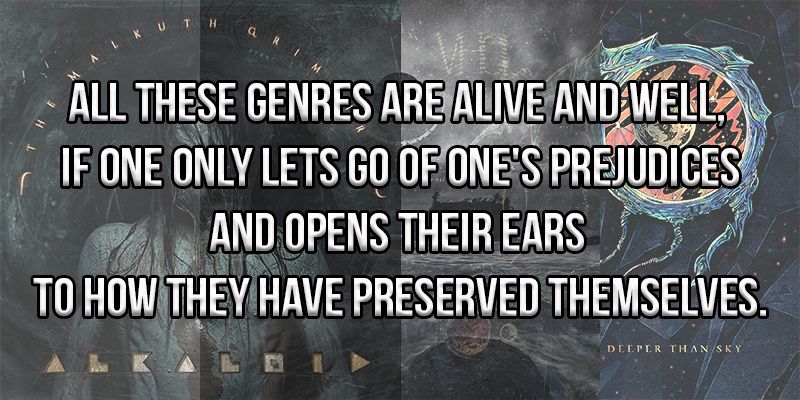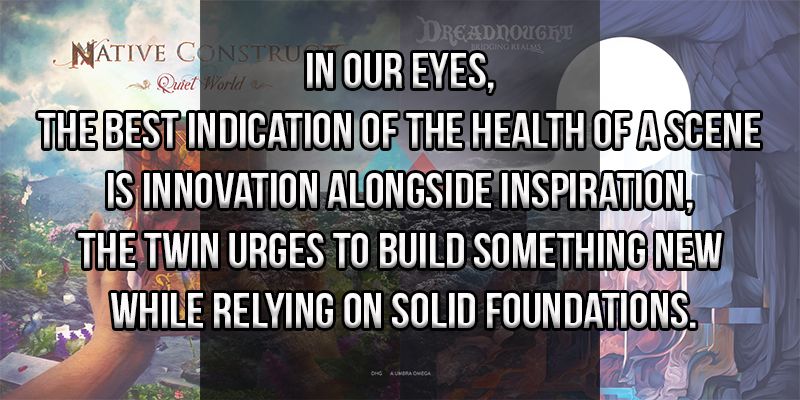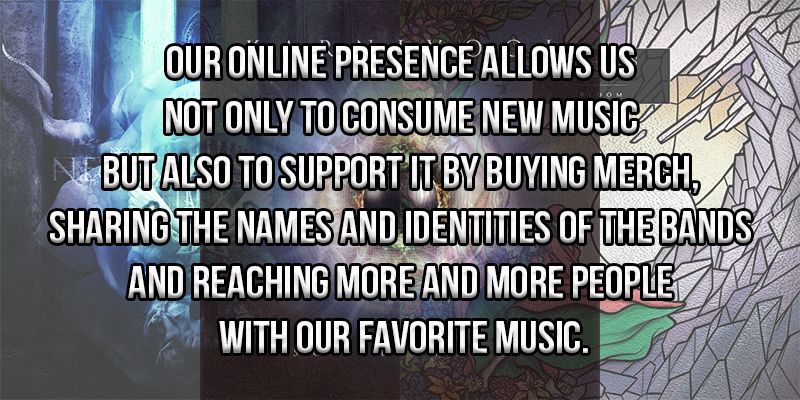As a student of history, I have a hard time with categorizing and cataloging periods of time. These definitions always hide more than they reveal, neatly tucking away variations, deviations and anything else that might not fit the narrative they are trying to promulgate. However, that’s not to say that they don’t have their uses: like all labels, they are tools bred by convenience and necessity, allowing us to hold conversations which might otherwise be impossible. In order to best use them then, we need to make sure that they are in check, balanced by a clear and direct disclaimer which reminds us that they are only that, convenient, disposable labels that serve a limited purpose.
And so, we come to “The Golden Age of Metal”, a chronological classification which has been thrown around on the blog, and in the community, for a while now. In order to unpack this classification, we must first ask: what is a golden age? In history, it is used to connotate a period in which a society, culture or political unit flourish in more fields than one. That is, if a nation undergoes a fast-paced military reform but falls on its face in economy or diplomacy for example, that is not a golden age. But if that nation flourishes culturally alongside its military evolution, coupled with a rise in philosophy, diplomacy and music, that is a golden age.
Therefore, our goal and, indeed, this article’s goal is to examine the term “The Golden Age of Metal” in light of these definitions and see if our time can be classified as such. We’ll also touch upon other eras worthy of the term and ask what did or did not qualify them for the term. Lastly, before we dig into the meat of the article, it must be remembered, as with anything you read, that subjectivity plays a part here. Many of my points will be based on more “objective” facts, like proliferation and innovation, but some of them will be based on enjoyment and personal taste. Take those with a pinch of salt and remember: if you don’t feel like the Golden Age is now, then for you it isn’t. But for plenty of us, it really is. Let’s get started, we’ve even made you a Spotify playlist of the bands mentioned here to keep you company!
It might serve us well to begin with our detractors. According to these, encompassing various people, opinions and identities, the Golden Age of Metal has come and gone. Where exactly they locate this fallen age depends on the personal preferences of the specific detractor: it could be the birth of death metal and the fervor that it entailed in the mid-90’s. It can be even earlier, around the genesis of thrash/speed metal in the 80’s. Some even cite the early bloomings of black metal, with its abrasive production and dubious personalities as the essence of the metal spirit, an essence now lost to commercialization and fakery.
However baseless and hollow these claims appear to us, they also provide us with a unique opportunity to open with a strong claim for our own Golden Age. All these genres are alive and well, if one only lets go of one’s prejudices and opens their ears to how they have preserved themselves. Is it oldschool death metal you lust for? Alkaloid have released a brilliant album this year, building on and expanding on elements of classic, Gothenburg style metal. Obscura is also on their way. Melodeath was a big part of that 90’s scene and Borknagar have an album coming out in 2016.
Do you pine for the feverish twitchings of thrash? Overkill, one of the most oldschool names out there, had a perfectly solid release last year. In realms slightly more innovative, VHOL are absolutely kicking ass with their stoner-tinged thrash. Lastly, black metal, whose fans have perhaps fought the hardest against any type of optimism towards the current state of affairs, also has some very prestigious releases to its name in recent years. Even if you don’t want to subscribe to the Deafheaven fad, how about Downfall of Gaia, Myrkur, Behemoth (blackened death yes, but still plenty of black), An Autumn for Crippled Children or Keep of Kalessin? All of these bands are making black metal to some sort of extent, even if it is fueled by new ideas, and have released great music this year, or the last.

And that’s a good thing. That’s a great thing; there’s a reason these sounds are old-school. We’re happy to see these genres hanging around and exactly because we are optimistic about the state of the scene. Because if we add to this fact a second one, we get the main point that makes us optimistic about the current state of affairs. In our eyes, the best indication of the health of a scene is innovation alongside inspiration, the twin urges to build something new while relying on solid foundations. This type of advancement prevents groundless, formless, pointless musings on musical themes while making sure that the scene doesn’t fall into stagnation; it allows bands to make new and exciting music but to also reach and explore new places with their current, modern iterations on those basic building blocks.
We have two fields then for our Golden Age, but that’s not quite enough. Worry not; alongside this form of careful, solid innovation, metal has its share of new, young and exciting ideas. We’ve extolled the many virtues of post-metal before, so we won’t bore you by doing so again. Suffice to say that it represents only one prong of where metal is going these days. What about the return to classical music and composition found in creations like Dreadnought‘s Bridging Realms or the electronic antiques of one Remi, AKA The Algorithm? Infusions of avant-garde and metal also exist: Dodheimsgard for example released a brilliant album last year, combining theatrics, black metal and a lot more. In progressive metal as well, the chromatic obsessions of Native Construct push the genres into new sounds and places, while the genre-defying stunts of Gods of Eden create a unique, signature sound that is impossible to pin down.

If this article seems heavy on the name dropping, that’s no accident. The sheer amount of modern, active bands we can cite hint at the next element to be added here: alongside innovation alongside inspiration and experimentation we have proliferation. While it would be foolish to say that there are more metal bands active today than in the past due to the impossibility of accurately verifying those numbers (although we suspect that is indeed the case), it’s almost axiomatically true to say that a lot more of these bands reach our ears. The internet is both chicken and egg in this case: it serves first to allow us access to these bands but is also the background upon which we then return to help those bands grow. Our online presence allows us not only to consume new music but also to support it by buying merch, sharing the names and identities of the bands and reaching more and more people with our favorite music.
Proliferation also shows itself in the “real world”, whatever that means anymore. While we’re still waiting for a Karnivool US tour (seriously guys), it would do us well to stop and see how blessed we are: smaller and smaller bands are crossing the Atlantic, and not only in the direction of the US. Europe, always a hotbed for metal, has seen its share of incoming, international bands (the Australian Ne Obliviscaris and Caligula’s Horse to name just two), perhaps adding some much needed diversity to its old, old blood. What’s more, fans are filling venues all across the world, with sold out shows spanning not only geography but ages, genres and social groups.

Which leads us to our final and, perhaps, most controversial points. At the end of the day, music wouldn’t be the same (and perhaps not even exist in the modern sense of the word) without close ties to consumerism. It’s both a product and a statement, cultural affiliation and a transaction. In recent years, there have been many contradicting claims: sales have been on the rise, on the fall, changing, unmeasurable and predictable at the same time. Streaming, digital downloads and piracy have changed the playing field, making it something new. However, is it for the better or for the worst? Has the chance of making it big increased or decreased with the advent of online marketing and music sharing?
We’re not here to settle any of these scores because, frankly, we don’t have the tools. But as perhaps a closing statement, let me ask you: do you think that metal is on the rise? Do you feel the Golden Age of Metal? If yes, brilliant, welcome, enjoy the ride. If not, why not? If not, do you not feel that perhaps some, only some, of the responsibility for that lies on you? How many albums have you purchased in recent years? How many bands have you discovered, obsessed over, shared with friends? How many live shows that you were able to go to did you go to? At the end of the day, this “Golden Age”, whatever it is, relies on both sides of the equation. This heady, intoxicating feeling of being part of something that’s alive and kicking, perhaps even more than ever, requires that you participate, engage and challenge yourself.
The Golden Age of Metal is right fucking now. If you want it to be.
-EK